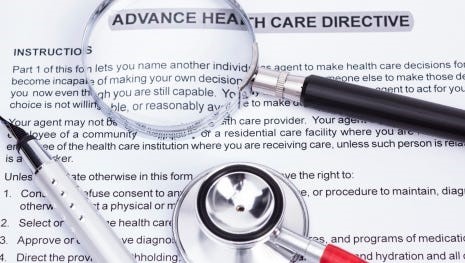It’s 2 a.m. and my pager goes off. I call into the hospital and the nurse who paged me states that an elderly patient is on a ventilator. The patient’s physicians have been gently recommending for a while that the family consider removing artificial life- sustaining treatment as the patient is incurable and has no neurological activity. The patient never completed any advance directives so the medical team does not have any clear guidance on what the patient would want. Now the patient is unresponsive and unable to communicate, and the family is in heated conflict about what to do.
The patient’s wife has said her husband would not want to be kept alive “hooked up to machines and suffering” but some of the family is angry and accuses the patient’s wife of “killing their dad.” Old family wounds are ripped open. A heated argument breaks out among the family members. As a hospital chaplain, that’s when I would come in. The medical staff wants me to defuse the situation and help bring the family to a unified conclusion.
Few things cause as much suffering and confusion as when people are at the end of their life. Loved ones are often forced to make some of the most complicated and far-reaching decisions of their life with limited information and under rushed and harried circumstances. All the family members have good intentions but they have limited knowledge of what end-of-life decision-making (also called advance care planning) actually means.
Usually in such a circumstance I could bring the family to a consensus and they could move forward with a decision about what medical approach would be used. But not always. And even when a consensus was forged, there were almost always lingering resentments and emotional pain; indeed, how could there not be? People often have no idea what artificial forms of life sustaining treatment actually do. And unfortunately aggressive medical interventions such as ventilators, CPR and dialysis are used in radically different ways from what they were originally intended for, and patients and families end up suffering as a result.
How our loved ones die also impacts how we grieve. Grieving is never easy, but it’s one thing when you know what your loved one would want regarding end-of-life decision-making; it’s much harder when you have no idea what your loved one would want, the family is at odds and you are forced to guess what your loved one would want. That kind of suffering is horrific, it happens all the time, and it’s easily preventable.
I’m a psychologist now, but when I worked as a Zen hospital chaplain I took hundreds of calls like this. Most people actively avoid thinking about end-of-life issues, and that’s too bad because death is universal, suffering at the end-of-life is far more common than people realize, and when you see someone suffer needlessly at the end of their life, you don’t ever want to see that again.
Fortunately, there is good news. There are free forms, known as advance directives, that are easy to fill out that can help protect you when you cannot speak for yourself. Advance directives are a gift to yourself and a gift to your family. They help protect you when you are most vulnerable because they help ensure that you get the kind of medical care that you want when you are unable to speak for yourself. And advance directives are a gift to your family because they tell your family exactly what you want. They also help alleviate the difficulty of being a caregiver, and they empower your family to honor your wishes, which is better for both the patient and the family.
All 50 states have some form of advance directives. You can consult with an attorney, search for them online or ask any medical professional at a medical facility that you use. In Texas, the Department of Health and Human Services provides several free complimentary types of advance directives in both English and Spanish, which you can find online at hhs.texas.gov/regulations/forms/advance-directives.
Two of the most common types of advance directives are the Directive to Physicians and Family or Surrogates (also known as a living will) and the Medical Power of Attorney. As the Texas Health and Human Services website states, a living will is “designed to help you communicate your wishes about medical treatment at some time in the future when you are unable to make your wishes known because of illness or injury.” It describes the MPOA noting, “Except to the extent you state otherwise, this document gives the person you name as your agent the authority to make any and all health care decisions for you in accordance with your wishes, including your religious and moral beliefs, when you are no longer capable of making them yourself.”
Advance directives are only in force if the patient cannot communicate for themselves. They can be edited or changed at any time. Photocopies are also legally binding. For most forms you do not need a notary to sign, although you do need witnesses, which are easy to obtain. Anyone who could be involved in a conversation about your end-of-life decision-making should have a copy of your advance directives; you want to make sure everyone in your circles knows what you want.
A living will and an MPOA work together because while a living will specifies what you do or don’t want, it’s hard to predict all the complexities that can arrive in medical treatment. The MPOA complements the living will because you can select a medical power of attorney who can speak on your behalf if anything unexpected arises. When choosing a medical power of attorney, you want to make sure you choose someone who is accessible, willing to serve in this role, and will act in accordance with your beliefs. Another skillful feature of MPOA’s is you can name backups in case your first choice is not available for any reason.
If you’d like to learn more about advance directives, and possibly complete them for yourself and your family, I encourage you to consult with the GIFT Project (Giving Instructions for Tomorrow) of Hospice Austin.
Hospice Austin is a nonprofit interdisciplinary medical organization providing comfort, dignity and peace for people with serious illness in their final months of life. Many people are surprised to learn that Hospice Austin is the third-oldest hospice in the country, and a leader internationally in end-of-life care.
GIFT is a free program of Hospice Austin, but you don’t have to be connected to hospice to utilize its resources. The program provides free resources and workshops empowering people to tailor their medical decisions to their own unique values and beliefs. The GIFT program is made possible by a generous grant from the St. David’s Foundation.
In celebration of National Healthcare Decisions Day, Hospice Austin’s GIFT Project, together with Meals on Wheels and AGE of Central Texas, is hosting an “Advance Care Planning Made Easy” event where folks can drop by, learn about advance directives, get their questions answered from doctors, nurses and social workers, and enjoy a free meal from Jason’s Deli. There also will be witnesses available for those who want to complete their advance directives.
The event will be from 11 a.m. to 1 p.m. on Wednesday, April 13, in the parking lot of Mt. Zion Church, 2938 East 13th Street. Please contact Shirley Price for more information at 737-346-9939 or visit the GIFT website at hospiceaustin.org/advance-directives/the-gift.
In Buddhism there is a saying: samsara and nirvana are one, meaning great joy and great suffering can exist together. Death ends a biological life, but death can also save a human life because our mortality compels us to ask how do we want to live our lives, what is most important to us, what really matters in the end? As the sociologist Morrie Schwartz observed, “When you learn how to die, you learn how to live.” It’s comforting to know that when patients and families need help the most, they can have it, now all we need to do is get the word out.

Dr. David Zuniga
Psychologist
This article originally appeared in David Zuniga’s column in the Austin American-Statesman: https://www.statesman.com/story/news/2022/04/08/zen-daily-living-transforming-death-and-grief/9516576002/





